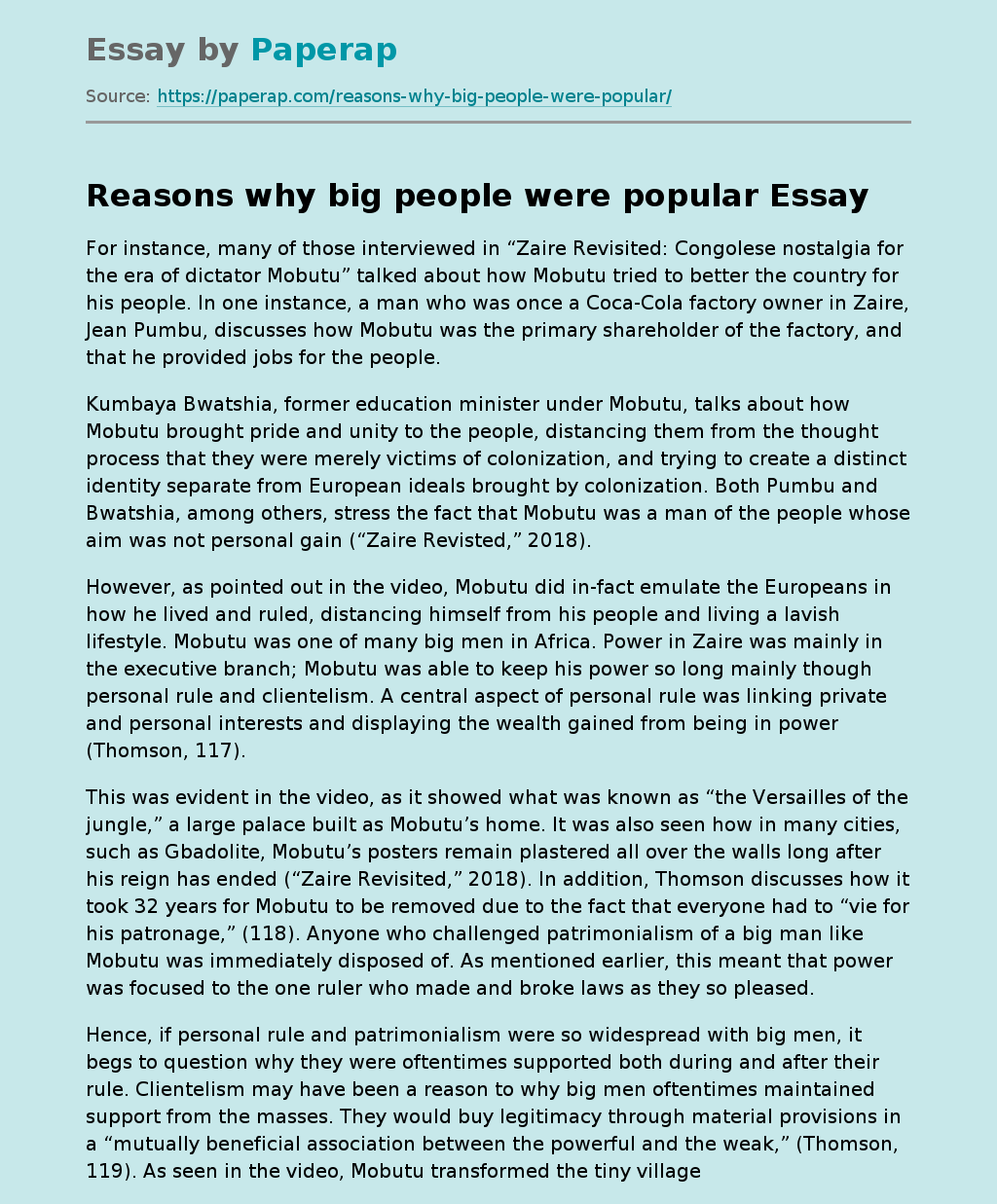Reasons why big people were popular
For instance, many of those interviewed in “Zaire Revisited: Congolese nostalgia for the era of dictator Mobutu” talked about how Mobutu tried to better the country for his people. In one instance, a man who was once a Coca-Cola factory owner in Zaire, Jean Pumbu, discusses how Mobutu was the primary shareholder of the factory, and that he provided jobs for the people.
Kumbaya Bwatshia, former education minister under Mobutu, talks about how Mobutu brought pride and unity to the people, distancing them from the thought process that they were merely victims of colonization, and trying to create a distinct identity separate from European ideals brought by colonization.
Both Pumbu and Bwatshia, among others, stress the fact that Mobutu was a man of the people whose aim was not personal gain (“Zaire Revisted,” 2018).
However, as pointed out in the video, Mobutu did in-fact emulate the Europeans in how he lived and ruled, distancing himself from his people and living a lavish lifestyle.
Mobutu was one of many big men in Africa. Power in Zaire was mainly in the executive branch; Mobutu was able to keep his power so long mainly though personal rule and clientelism. A central aspect of personal rule was linking private and personal interests and displaying the wealth gained from being in power (Thomson, 117).
This was evident in the video, as it showed what was known as “the Versailles of the jungle,” a large palace built as Mobutu’s home. It was also seen how in many cities, such as Gbadolite, Mobutu’s posters remain plastered all over the walls long after his reign has ended (“Zaire Revisited,” 2018).
In addition, Thomson discusses how it took 32 years for Mobutu to be removed due to the fact that everyone had to “vie for his patronage,” (118). Anyone who challenged patrimonialism of a big man like Mobutu was immediately disposed of. As mentioned earlier, this meant that power was focused to the one ruler who made and broke laws as they so pleased.
Hence, if personal rule and patrimonialism were so widespread with big men, it begs to question why they were oftentimes supported both during and after their rule. Clientelism may have been a reason to why big men oftentimes maintained support from the masses. They would buy legitimacy through material provisions in a “mutually beneficial association between the powerful and the weak,” (Thomson, 119). As seen in the video, Mobutu transformed the tiny village of Gbadolite into a modern town, but many buildings were left incomplete. He also provided jobs through factories, as shown through the Coca-Cola factory he opened (“Zaire Revisited,” 2018).
Furthermore, another important aspect that allowed for continued support of big men was their justification for their ways. They maintained that a single-party state was essential for unity, especially since the countries recently gained independence. They also suggested that a single-party state is more similar to how African communities functioned before colonialism, and that it was unnecessary, and possibly even harmful, to build a multi-party state that emulated Western countries (Thomsan, 111-113).
Mobutu used this type of justification for many of his orders throughout his rule. According to Norval, Mobutu “played the cards of patriotism and national pride,” (“Zaire Revisited,” 0:37-0:41). For instance, he forced men to wear a certain type of tunic, as well as obliging the population to choose names that were of African origin. While many considered these rules overbearing, others interviewed in the video saw these rules as a way to gain African pride and patriotism, and as a way to rid themselves from any traces of colonial rule (“Zaire Revisited,” 2018).
Finally, an interesting facet that is unique to why big men remain popular after their rule is a characteristic that can be witnessed globally. Yekima, an artist interviewed in the video, says that “we tend to create an idealistic image of the former president against a new one. When our current president leaves, the next one will make us idealize him — and so on” (“Zaire Revisited,” 14:50-15:05). This is a rough summarization of why big men tend to receive popular support after their rules. This is not an uncommon phenomenon; idealizing the past is typical of people and societies in general. For instance, here in the United States, we often look back at past presidents idealistically when dealing with our present issues. As a society, we tend to forget the struggles dealt with previously and focus only on the positive outcomes.
Overall, although big men such as Mobutu oftentimes drove their countries to debt and destruction, their support from the masses can be understood when noticing how the big men framed their actions to make them seem as though they were helping the population. From the perspective of the people of Congo, they were receiving some benefits (through clientelism), such as jobs, even though they were being ruled under a strict and corrupt Mobutu. After Mobutu’s departure, many lost their jobs, and cities were left incomplete. Mobutu gave them a sense of advancement and improvement; even if these improvements were a façade, it felt real to the people. “Zaire Revisited,” thus, shows how even under the most corrupt rulers, a mask of patriotism and leadership can be displayed to the masses.
Reasons why big people were popular. (2021, Dec 05). Retrieved from https://paperap.com/reasons-why-big-people-were-popular/

